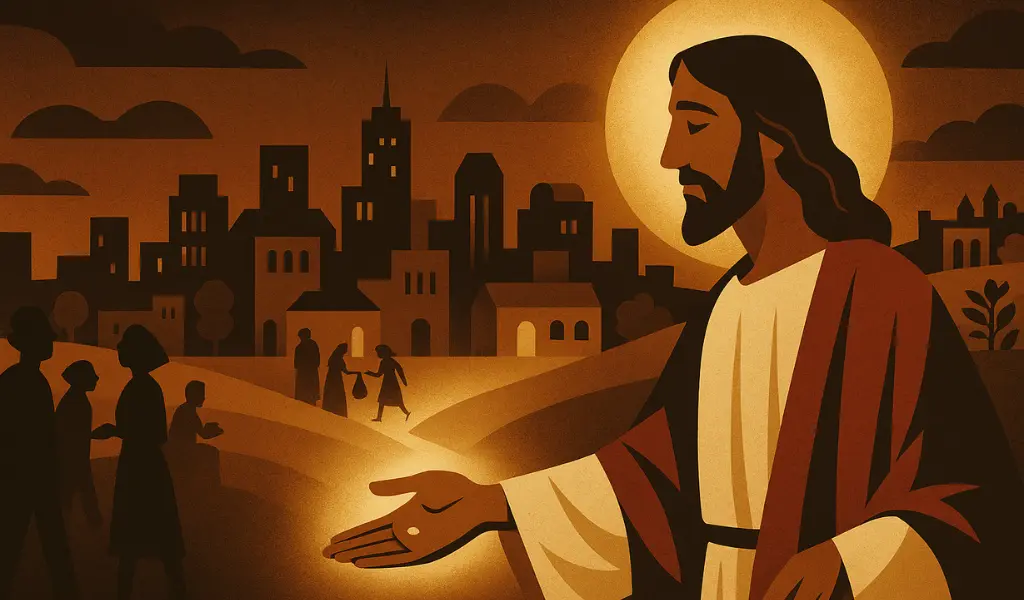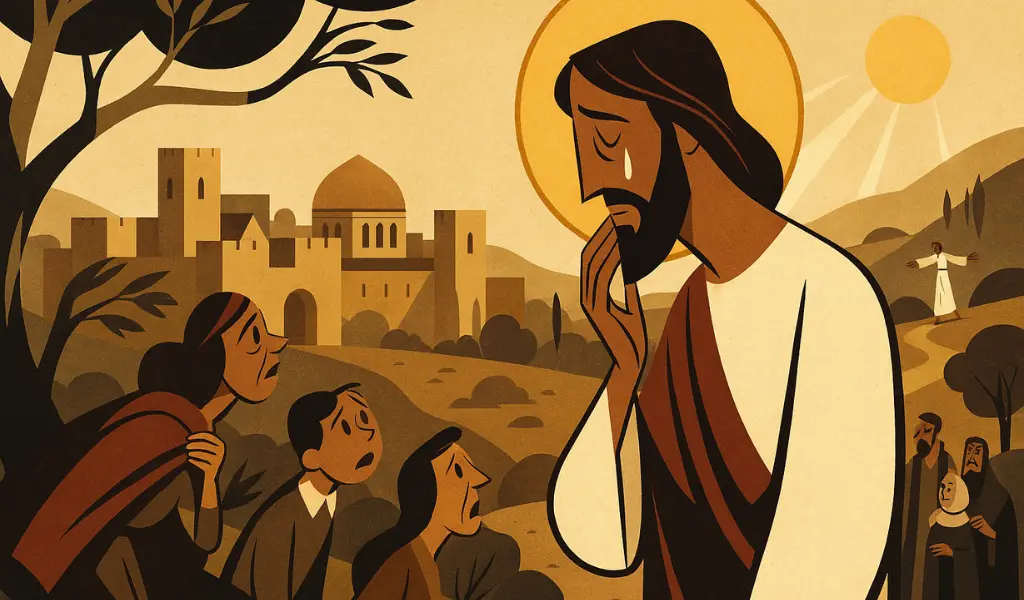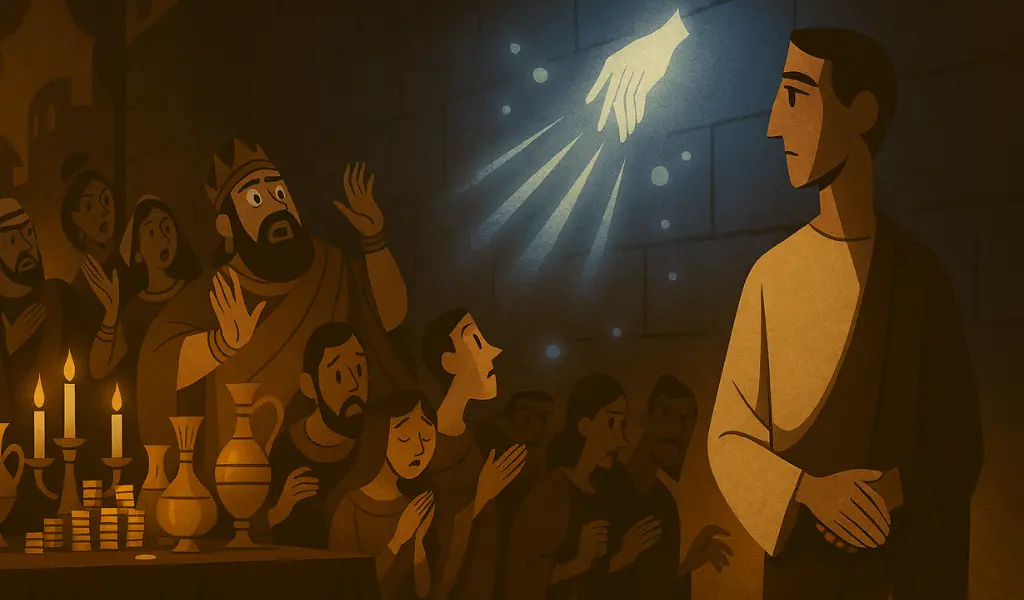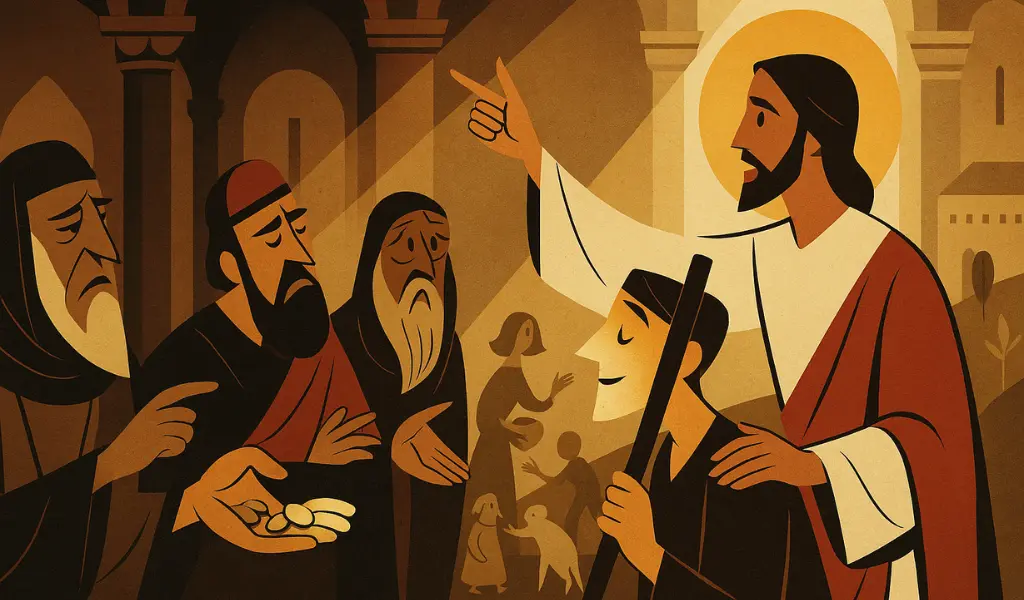When God Weeps Over Us
Catholic Homily for November 20, 2025
Thursday of the Thirty-Third Week in Ordinary Time
Luke 19:41–44
As Jesus approached Jerusalem for the last time, something extraordinary happened. He stopped, looked at the city spread out before Him, and began to weep. Not just a few tears, but deep, heartbroken sobbing – the kind of weeping that comes from profound grief.
This wasn’t tears of physical pain or personal sorrow. These were tears of love looking at missed opportunities. Jesus was weeping over a city – over a people – who were about to reject the very salvation they had been waiting for.
Through His tears, Jesus spoke words of both love and warning: “If you, even you, had only recognized on this day the things that make for peace! But now they are hidden from your eyes.” He went on to prophesy the destruction that would come to Jerusalem – enemies surrounding the city, walls being torn down, not one stone left upon another.
These weren’t the words of an angry judge pronouncing sentence. These were the words of a heartbroken lover who could see the tragedy that was about to unfold because the people He loved couldn’t recognize that God Himself was visiting them.
The Heart Behind Judgment
When we think about God’s judgment, we often picture it as cold, distant, and mechanical – like a computer calculating who deserves punishment. But Jesus’ tears over Jerusalem show us something completely different. God’s judgment is never cold. It comes from a heart that is breaking over our choices.
Jesus wept because He could see what was coming. He knew that within a generation, Jerusalem would be destroyed by the Romans (which happened in 70 AD). He knew that the people He loved were about to miss their moment of salvation and face terrible consequences.
But notice the order of events: mercy comes first, then warning, then judgment. God doesn’t surprise us with consequences. He visits us with grace, gives us opportunities to choose differently, warns us when we’re heading toward danger, and only allows judgment when we persistently refuse His love.
Mercy knocks before the wall goes up. Peace offers itself before the enemy surrounds. Love pleads before the stones fall.
Missing Our Visitations
The tragedy of Jerusalem was that they didn’t recognize “the time of their visitation.” God was visiting them in the person of Jesus – teaching, healing, offering forgiveness and new life. But they were so focused on their own expectations and agendas that they missed what God was actually doing.
We do the same thing. God visits us regularly, but we often don’t recognize it. His visitations rarely look like what we expect. They come disguised in ordinary moments and everyday encounters.
We miss visitations when we brush aside a word of truth that challenges us. Maybe someone points out a character flaw we need to address, or we read something in Scripture that convicts us, or we hear a sermon that hits too close to home. Instead of receiving it as God’s voice, we get defensive or dismiss it.
We miss visitations when we postpone chances to reconcile. God gives us opportunities to heal broken relationships, to forgive people who have hurt us, to make amends for our own mistakes. But we tell ourselves we’ll deal with it later, when we feel more ready, when the other person changes first.
We miss visitations when we ignore nudges to pray. The Holy Spirit prompts us to pause in our busy schedules and spend time with God, but we keep moving. We’re too busy, too distracted, too focused on our own priorities to recognize that the Creator of the universe wants to meet with us.
Peace stands at the gate, but we keep walking past without stopping to let it in.
The Things That Make for Peace
Jesus wept because Jerusalem didn’t know “the things that make for peace.” What are those things? How do we recognize them when God offers them to us?
The things that make for peace are often the opposite of what our natural instincts tell us to choose:
Surrender over stubbornness – Peace comes when we stop fighting God and fighting others, when we’re willing to admit we don’t have all the answers and we need help. Stubbornness keeps us at war with reality. Surrender allows God to work in situations we can’t control.
Mercy over memory of wrongs – Peace comes when we choose to forgive rather than rehearse old hurts. Remembering wrongs keeps wounds fresh and relationships broken. Mercy allows healing to begin and love to flow again.
Prayer over noise – Peace comes when we choose quiet time with God over constant activity and distraction. The noise of our culture – social media, news, entertainment, busy schedules – keeps us agitated and anxious. Prayer centers us and reminds us of what really matters.
God’s timing over our timeline – Peace comes when we trust God’s schedule instead of demanding that He work according to our plans. We want instant answers and immediate results. God often works slowly, patiently, through processes we can’t see or understand.
His presence over our preferences – Peace comes when we learn to welcome Jesus however He chooses to come to us, not just when He comes the way we expect or want.
How to Welcome Hidden Visitations
Jesus often comes to us in disguise. He visits us in Scripture that challenges our assumptions. He stirs our conscience when we’re about to make poor choices. He shows up in a neighbor’s need that interrupts our comfortable routine.
Learning to recognize these hidden visitations requires spiritual alertness. We need to develop eyes that can see God’s activity in ordinary circumstances and ears that can hear His voice in unexpected places.

When Scripture makes us uncomfortable, instead of quickly moving on, we should ask: “What is God trying to show me here?” When our conscience is bothered by something we’re doing or not doing, instead of ignoring it, we should pay attention: “What is the Holy Spirit trying to tell me?”
When we encounter someone in need, instead of assuming it’s just a coincidence or an inconvenience, we should consider: “Could this be Jesus coming to me in disguise?”
Three Responses to His Tears Today
Pause at the gate – Make a brief examen: where is Christ visiting me now? Take a few minutes at the end of each day to ask yourself: Where did I sense God’s presence today? What circumstances, conversations, or thoughts might have been His way of speaking to me? What opportunities for grace did I receive? Did I welcome them or miss them?
Make peace – Take the first step to reconcile with one person or repay one debt. Don’t wait for the other person to apologize first. Don’t wait until you feel like doing it. Don’t wait for perfect conditions. If there’s someone you need to forgive, someone you owe an apology to, or someone you owe money to, take the first step today. This is how we cooperate with God’s visitation of peace.
Keep vigil – Give the Lord a set time of quiet and let His word lead your next decision. Choose a specific time each day to be still before God. Read Scripture slowly and prayerfully. Instead of rushing through prayers with your own agenda, listen for what God might want to say to you. Then let what you hear in prayer influence the decisions you make throughout your day.
He Still Draws Near
The beautiful truth is that Jesus still draws near to us, just as He drew near to Jerusalem. He still looks at our lives with love. He still offers us the things that make for peace. He still visits us with grace and mercy.
But like Jerusalem, we can miss our moment. We can be so busy with our own plans that we don’t recognize when God is trying to bless us, heal us, or redirect us toward something better.
The difference between Jerusalem’s tragedy and our opportunity is simple: we can learn from their mistake. We can develop eyes to see and ears to hear when God is visiting us. We can choose to welcome Jesus however He comes – in His word, in our conscience, in the needs of others, in the circumstances of our lives.
When we do this, we give the Lord joy instead of tears. We prove that His love for us was not wasted. We show that His sacrifice was worth it because we received the peace He died to give us.
Let us recognize our visitation. Let us receive the things that make for peace. Let us be people who cause Jesus to rejoice rather than weep over us.
Let us pray,
Lord Jesus, we don’t want to be like Jerusalem, missing the time of our visitation. Open our eyes to see where You are visiting us today – in Your word, in the promptings of conscience, in the needs of others around us. Give us hearts that choose surrender over stubbornness, mercy over remembering wrongs, prayer over the noise of this world. Help us recognize the things that make for peace and welcome them with open arms. May our lives bring You joy, not tears, as we learn to see and receive Your presence in every moment. Amen.
❤️ Thank You dear friend, hope this reflections touched you. 🙏 Please do not forget to share with your loved ones this november 20 homily.
If you like Catholic Homily for november 20, 2025, do not forget to give your comment below. And please 🫂 join our whatsapp channel for everyday 🔔 update 👇👇👇





Leave a Comment